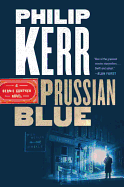
Philip Kerr came to acclaim with March Violets, the first in his Berlin Noir thrillers starring detective Bernie Gunther, with a supporting cast of assorted Nazis. Prussian Blue, 12th in the series, is a knockout, zipping along like a car with a cut brake line.
In 1956, Gunther's working at a Riviera hotel, and is tricked into dinner with an old nemesis, Erich Mielke, now with the East German secret police. Gunther is to pay a prior debt by poisoning a certain woman, but escapes Mielke and sets off for West Germany. As he flees, he recalls another trip, almost 20 years earlier, when he thought himself "possessed of a sense of decency and honor I now found almost quaint."
In 1939, Reinhard Heydrich summoned Gunther to his office and gave him seven days to solve a murder at the Berghof, Hitler's home in Berchtesgaden. Gunther stayed on point with coffee and meth, while negotiating the mare's nest of various Nazi intrigues, determined to find the killer. His investigation was, not surprisingly, perilous--"the greatest mystery on this magic mountain is how I'm going to break this case without myself getting broken permanently."
As the novel swings between decades, Bernie Gunther's saving graces are his cynical humor and sense of honor as he seesaws between angst and Weltschmerz. But he wonders at his capacity to work for an evil regime. He wonders why he didn't plant a bomb in Hitler's study. The reader wonders with him, but knows he will stay the course, even when events of the two decades stunningly converge. --Marilyn Dahl

